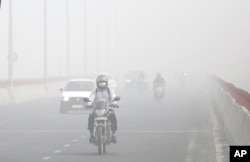Supervised by young engineers, workers at the start-up company Chakr Innovation in New Delhi cut and weld sheets of metal to make devices that will capture black plumes of smoke from diesel generators and convert it into ink.
In a cabin, young engineers pore over drawings and hunch over computers as they explore more applications of the technology that they hope will aid progress in cleaning up the Indian capital’s toxic air – among the world’s dirtiest.
While the millions of cars that ply Delhi’s streets are usually blamed for the city’s deadly air pollution, another big culprit is the massive diesel generators used by industries and buildings to light up homes and offices during outages when power from the grid switches off – a frequent occurrence in summer. Installed in backyards and basements, they stay away from the public eye.
“Although vehicular emissions are the show stoppers, they are the ones which get the media attention, the silent polluters are the diesel generators,” says Arpit Dhupar, one of the three engineers who co-founded the start up.
The idea that this polluting smoke needs attention struck Dhupar three years ago as he sipped a glass of sugarcane juice at a roadside vendor and saw a wall blackened with the fumes of a diesel generator he was using.
It jolted him into joining with two others who co-founded the start-up to find a solution. Dhupar had experienced first hand the deadly impact of this pollution as he developed respiratory problems growing up in Delhi.
A new business
As the city’s dirty air becomes a serious health hazard for many citizens, it has turned into both a calling and a business opportunity for entrepreneurs looking at ways to improve air quality.
According to estimates, vehicles contribute 22 percent of the deadly PM 2.5 emissions in Delhi, while the share of diesel generators is about 15 percent. These emissions settle deep into the lungs, causing a host of respiratory problems.
After over two years of research and development, Chakr has begun selling devices to tap the diesel exhaust. They have been installed in 50 places, include public sector and private companies.
The technology involves cooling the exhaust in a “heat exchanger” where the tiny soot particles come together. These are then funneled into another chamber that captures 70 to 90 percent of the particulate matter. The carbon is isolated and converted into ink.
Among their first clients was one of the city’s top law firms, Jyoti Sagar Associates, which is housed in a building in Delhi’s business hub Gurgaon.
Making a contribution to minimizing the carbon footprint is a subject that is close to Sagar’s heart – his 32-year-old daughter has long suffered from the harmful effects of Delhi’s toxic air.
“This appealed to us straightaway, the technology is very impactful but is beautifully simple,” says Sagar. Since it could be retrofitted, it did not disrupt the day-to-day activities at the buzzing office. “Let’s be responsible. Let’s at least not leave behind a larger footprint of carbon. And if we can afford to control it, why not, it’s good for all,” he says.
At Chakr Innovation, cups, diaries and paper bags printed with the ink made from the exhaust serve as constant reminders of the amount of carbon emissions that would have escaped into the atmosphere.
There has been a lot of focus on improving Delhi’s air by reducing vehicular pollution and making more stringent norms for manufacturers, but the same has not happened for diesel generators. Although there are efforts to penalize businesses that dirty the atmosphere, this often prompts them to find ways to get around the norms.
Tushar Mathur who joined the start up after working for ten years in the corporate sector feels converting smoke into ink is a viable solution. “Here is a technology which is completely sustainable, a win-win between businesses and environment,” says Mathur.






